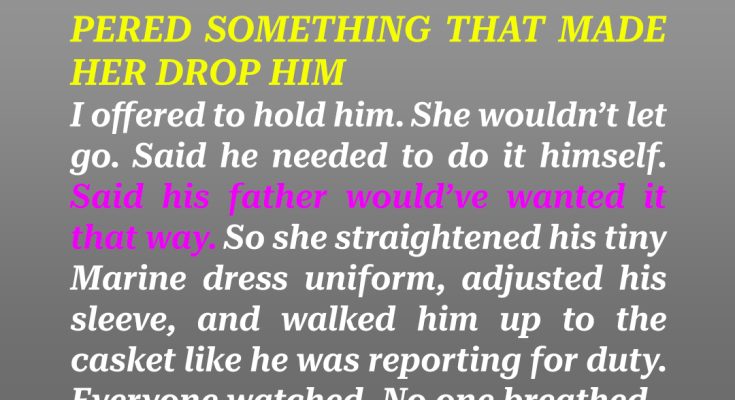I offered to hold him. She wouldn’t let go. Said he needed to do it himself. Said his father would’ve wanted it that way. So she straightened his tiny Marine dress uniform, adjusted his sleeve, and walked him up to the casket like he was reporting for duty.
Everyone watched. No one breathed.
The casket was closed. Thank God. But it had the emblem, the rose, the impossible weight of everything she didn’t get to say. He was supposed to be home for the birth. He missed it by nine days.
And now here we were.
She held him closer as they reached the edge. He pressed his little hand to his forehead—awkward, wobbly, but perfect in its own way. She smiled through it. I thought maybe that moment would carry her through the rest of the day.
Until he leaned toward the wood.
And said, soft and certain:
“That’s not Daddy.”
She froze.
He said it again. Louder. Like a correction.
“That’s not my Daddy in there.”
And then—silence. The kind that makes your ears ring. You could hear the sound of people shifting in their seats, the hushed cough of someone trying to mask their nerves, but mostly, you could hear her heartbeat breaking.
My sister’s arms trembled. She almost lost her grip on him. I rushed forward, ready to catch the boy if she did drop him. For a second, I thought she really might. She just stared at the casket, her face pale, her mouth slightly open like she wanted to say something but couldn’t.
Finally, she managed to whisper, “What do you mean, sweetheart?”
The boy looked at her with those wide, steady eyes children sometimes have—the kind that see more than you think they should. “That’s not Daddy,” he repeated, calmer now. “Daddy’s not in there. Daddy’s still here.” He pressed his small hand to his chest.
Murmurs spread across the room. Some people shook their heads, dismissing it as the confusion of a child too young to grasp death. Others looked uneasy, like they weren’t sure what to believe. My sister just clutched him tighter, and then she broke—sobbing, shaking, holding on like she was drowning and he was the only thing keeping her afloat.
I stepped in, put my arms around both of them, and guided them back to the pew. But those words hung in the air. People kept stealing glances at us, whispering behind hands.
The rest of the service blurred together. I remember the folded flag, the gun salute, the sound of taps piercing the silence. But mostly, I remember my nephew’s voice echoing in my head. “That’s not Daddy.”
Later, at the reception, people kept coming up to us, offering condolences, casseroles, and awkward hugs. My sister smiled politely, but her eyes stayed far away. Finally, when we were alone in the church kitchen, she whispered, “What if he’s right?”
I didn’t know what to say. I told her he was too young to understand. That kids say strange things in grief. That he was probably just trying to protect her. But she shook her head. “No. You didn’t see his face. He meant it. He believed it.”
That night, after everyone had gone home, she called me. Her voice was raw. “I can’t stop thinking about it. What if they made a mistake?”
I reminded her that the Marines had come personally. That they’d confirmed everything. That the casket was closed for a reason. But she wouldn’t let it go. “They told me not to look. They told me to trust them. But what if they were wrong? What if it’s not him?”
For weeks after, she kept bringing it up. Sometimes in whispers, sometimes in tears, sometimes in anger. And the more she pressed, the more I started to wonder too. The body had been recovered overseas, badly damaged, they’d said. Identified by tags and paperwork. But there had been no DNA test, no photographs. Just trust.
One afternoon, she showed up at my door with a stack of documents she’d requested from the military. “Look at this,” she said, pointing to inconsistencies I never would’ve noticed. A misspelled middle name on one form. A different rank listed on another. Small things, but enough to plant doubt.
I told her she was seeing patterns in grief. But inside, I felt the unease spreading too.
Then, one evening, something happened that changed everything. I was putting my nephew to bed when he turned to me and said, “Uncle, Daddy said to tell Mommy not to cry so much. He’s okay.”
My heart stopped. I asked him gently, “When did Daddy tell you that?”
“Last night,” he said simply. “When I was sleeping. He came and sat on my bed. He smelled like his jacket. He told me he was proud of me.”
I stared at him, unsure what to believe. Kids dream. Kids imagine. But the way he said it, calm and certain, made me wonder.
I didn’t tell my sister right away. I didn’t want to give her false hope. But the next morning, she came to me, eyes wide. “I had a dream,” she whispered. “He was standing at the foot of the bed. He didn’t say anything. Just smiled. And for the first time since all this started, I felt…peace.”
Was it just grief manifesting in strange ways? Maybe. But something inside me shifted that day.
She eventually requested a DNA test. At first, the military resisted. Too much bureaucracy, too many closed doors. But she pushed and pushed, and finally, months later, they agreed.
The results came back inconclusive. The remains were too degraded for certainty. Officially, they told her nothing had changed. But unofficially, the seed of doubt had grown into something bigger.
Years passed. She raised her son with strength I didn’t know she had. She never remarried, never stopped wearing her ring. And every year, on the anniversary of his supposed death, she and her son would visit the grave. He’d still salute, but he never called it Daddy’s grave. Always “the grave.”
Then, five years later, the phone rang. I’ll never forget her scream.
It was him. Alive.
Captured overseas, held for years, his identity erased, his records tangled in bureaucratic mistakes. The body in the casket had belonged to someone else, misidentified in the chaos of war. But he had survived.
When he came home, gaunt and scarred but alive, the reunion was something no words could capture. My nephew stood there in his little uniform, taller now, but still the boy who had once said, “That’s not Daddy.” And he was right all along.
The moment they embraced, all those years of doubt, pain, and whispered hope came crashing down in tears and laughter and disbelief. My sister held him like she’d never let go again.
And me? I stood there, shaking, realizing that sometimes children see truths we can’t. Sometimes they carry faith we’ve forgotten how to hold.
In the end, the lesson wasn’t about miracles or mistakes. It was about trust—the kind we put in institutions, the kind we put in ourselves, but most of all, the kind we put in the small voices we too often dismiss.
That day at the casket, everyone thought my nephew was confused. But he wasn’t. He simply knew something we didn’t.
And maybe that’s the real gift children give us. They remind us to listen, even when what they say seems impossible.
Because sometimes, against all odds, they’re right.
If this story touched you, share it. Remind someone you know that hope, no matter how fragile, is never wasted. Sometimes, it’s the very thing that carries us home.

